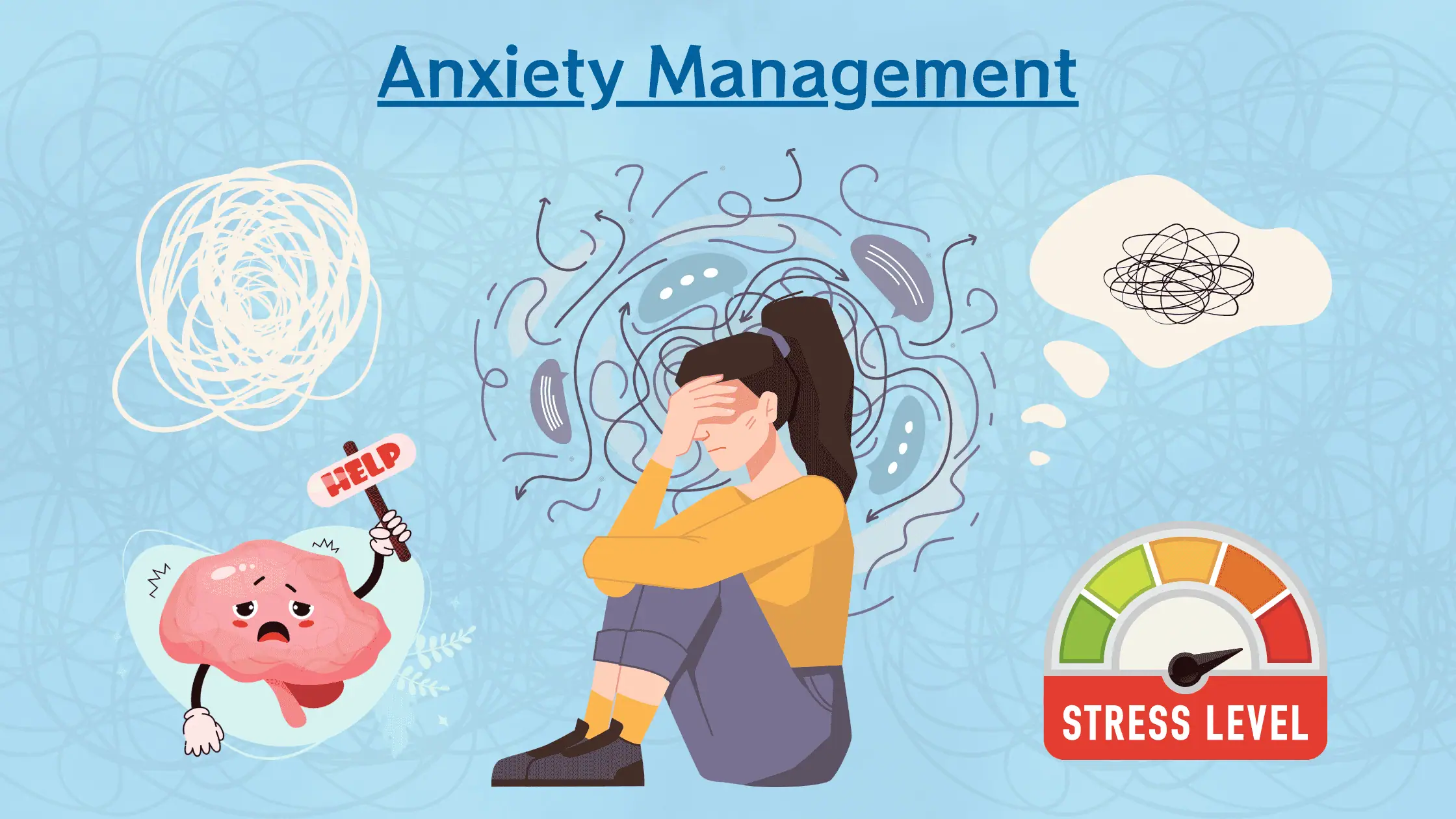Find peace and focus with reputable counseling services for anxiety
Discovering Different Methods in Coaching for Anxiousness Disorder for Lasting Change
When tackling anxiousness problems, it's important to discover a range of therapy techniques. Each approach supplies special understandings and tools to assist you handle your symptoms efficiently. You might discover that incorporating strategies can yield the ideal outcomes. However, recognizing the nuances of these approaches is key to cultivating enduring change. What happens if the ideal combination could launch a new degree of psychological wellness for you?
Understanding Anxiousness Problems: A Brief Introduction
Stress and anxiety conditions, which impact millions of individuals worldwide, can considerably impact life. You could experience overwhelming sensations of concern or worry that seem irrepressible. These feelings can lead to physical signs like a racing heart, sweating, and even dizziness. Typical kinds of anxiety conditions consist of generalised stress and anxiety problem, panic condition, and social anxiousness condition. Each has unique signs, yet they all share a propensity to disrupt your routine and relationships.Understanding the origin of your anxiousness is important. It could originate from genes, mind chemistry, or life experiences. Recognizing your triggers can help you handle your actions much better. It is very important to bear in mind that you're not the only one in this struggle. Lots of people deal with similar challenges, and seeking assistance is a solid step toward feeling much better. By finding out about stress and anxiety disorders, you're already on the course to understanding and managing your problem extra properly.
Cognitive-Behavioral Therapy: Testing Adverse Thought Patterns
In Cognitive-Behavioral Treatment, you'll start by recognizing the unfavorable idea triggers that add to your stress and anxiety. You'll function on replacing them with more positive options when you recognize these ideas. With each other, you'll build effective coping techniques to aid handle your anxiousness in daily scenarios.
Determining Unfavorable Thought Triggers

When you run into minutes of distress, identifying the certain triggers behind your unfavorable ideas can be crucial in managing stress and anxiety. Beginning by paying focus to scenarios that prompt feelings of worry or worry. Is it a crowded room, an upcoming deadline, or a conversation with particular people? Take down these circumstances in a journal. This will certainly help you identify patterns in your thinking. Notification physical experiences that accompany your unfavorable thoughts, like an auto racing heart or rigidity in your chest. By pinpointing these triggers, you gain understanding right into what's fueling your anxiousness. Comprehending these connections is the primary step in challenging those ideas and eventually restoring control over your emotional feedbacks.
Changing Thoughts With Positives
Testing unfavorable idea patterns is a necessary step in transforming your frame of mind and lowering anxiety. You may often discover on your own entraped in cycles of self-doubt or disastrous reasoning. Instead of letting these thoughts determine your sensations, practice replacing them with positive affirmations or reasonable options. When you assume, "I can't handle this," move it to, "I can handle obstacles one action at a time." This easy adjustment can greatly impact your psychological state. Frequently recognizing and countering these negative thoughts helps create a healthier internal dialogue. Remember, it takes time and effort, but constantly exercising this strategy can bring about long-term adjustment, encouraging you to encounter anxiousness with restored self-confidence and strength.
Structure Coping Approaches With Each Other
Changing unfavorable thoughts is only the start of taking care of anxiousness properly. To develop long-term modification, you need to build coping strategies that empower you. Cognitive-Behavioral Therapy (CBT) helps you identify and challenge those purposeless idea patterns. With each other, you and your therapist can explore how these thoughts impact your sensations and behaviors.Start by developing functional techniques, like journaling or mindfulness workouts, that permit you to confront stress and anxiety head-on. When you encounter your fears slowly, you'll find out to respond in a different way.

Mindfulness and Acceptance-Based Approaches: Growing Present-Moment Recognition
As you navigate the complexities of anxiousness, integrating mindfulness and acceptance-based approaches can substantially improve your capability to cultivate present-moment awareness. By focusing on the present moment, you'll discover that you can observe your ideas and sensations without judgment (Counseling services for anxiety). This method helps you acknowledge your anxiousness without really feeling bewildered by it.Engaging in mindfulness workouts, such as deep breathing, body scans, or led meditations, permits you to ground yourself in your present experience. Acceptance-based approaches encourage you to accept your feelings as opposed to fight against them. When you approve your sensations, they shed their power over you.Incorporating these methods into your daily regimen can change just how you react to anxiety. You'll develop durability and discover to browse demanding scenarios with greater ease. Ultimately, cultivating present-moment understanding lays the structure for long-term change, empowering you to lead a much more meeting life
Exposure Therapy: Challenging Anxieties Slowly
Exposure therapy aids you confront your anxieties in a gradual method, making it less overwhelming. You'll learn techniques to face anxiety-provoking situations detailed, while additionally building coping approaches to handle your responses. This technique empowers you to take control and lower anxiousness with time.
Progressive Exposure Methods

When dealing with anxiety, progressively facing your fears can be a powerful way to gain back control. This technique, referred to as steady direct exposure, involves gradually subjecting yourself to the scenarios or items that cause your stress and anxiety. Begin with less daunting situations and gradually work your method approximately even more tough ones. For circumstances, if you hesitate of public speaking, you could begin by speaking before a mirror, after that advance to sharing thoughts with a close friend, and ultimately attend to a tiny team. Each action aids desensitize you to the fear, building your self-confidence with time. Bear in mind, it's necessary to speed on your own and commemorate small success as you relocate through this procedure, strengthening your ability to handle anxiousness properly.
Building Coping Techniques
Building effective coping methods is vital for managing stress and anxiety, particularly as you confront your concerns gradually - Counseling services for anxiety. One powerful technique is exposure treatment, where you begin by facing your fears in a regulated way. Start with less intimidating circumstances and slowly function your means approximately more difficult circumstances. This steady direct exposure assists desensitize you to anxiety triggers, making them less overwhelming.Incorporate leisure techniques, such as deep breathing or mindfulness, to calm your mind during direct exposure. Track your development, commemorating little triumphes in the process to enhance your self-confidence. Keep in mind, it's okay to take your time; the objective isn't excellence but constant improvement. By building these approaches, you'll equip yourself to navigate anxiety and accept life a lot more totally
Psychodynamic Therapy: Revealing Origin Causes of Anxiety
Psychodynamic treatment checks out the subconscious mind, disclosing the root causes of your anxiety. By analyzing your ideas, sensations, and previous experiences, this strategy aids you uncover underlying disputes and unresolved problems that may add to your existing anxiety. You'll function with a specialist to investigate childhood experiences, partnerships, and emotional patterns that form your feedbacks today.As you get insight right into these deeper layers of your subconscious, you'll start to acknowledge exactly how previous occasions affect your existing behavior. This understanding can bring about catharsis, enabling you to refine feelings you could have suppressed.Through the restorative partnership, you can likewise recognize defense reaction that might have developed in time, supplying a more clear course to change. Eventually, psychodynamic treatment outfits you with the devices to address your anxiousness at its core, promoting long lasting change in your emotional well-being.
Alternative and integrative Strategies: Incorporating Strategies for Greater Efficacy
Incorporating various therapeutic strategies can improve your journey towards managing stress and anxiety extra efficiently. By integrating elements from cognitive-behavioral treatment, mindfulness methods, and holistic approaches, you can develop a customized technique that addresses your one-of-a-kind demands. For example, you may use cognitive-behavioral strategies to test negative idea patterns while including mindfulness workouts to ground on your own in today moment.Additionally, discovering all natural techniques such as yoga or reflection can promote leisure and reduce anxiety signs. This blend permits you to create greater self-awareness and resilience.Experimenting with these varied approaches can help you uncover what resonates most with you. Bear in mind, it has to do with discovering a harmony that works, as opposed to staying with a single technique. This integrative strategy not only offers instant relief but also promotes long-term skills for handling anxiousness, equipping you to recover control over your life.
The Function of Assistance Systems: Building Strength Through Connection
While it might appear that taking care of anxiety is a singular journey, having a strong support group can play an essential function in your strength. Surrounding on your own with understanding buddies, family, or support system develops a secure area where you can freely share your experiences and feelings. You advise yourself that you're not alone in this struggle.These partnerships supply motivation and can give functional coping approaches that have worked for others when you connect with others. It's likewise a possibility to obtain viewpoint; good friends can aid you see situations in different ways, minimizing sensations of isolation.Moreover, psychological assistance cultivates a feeling of belonging, which can significantly reduce stress and anxiety check here signs and symptoms. By leaning on your support system, you can build durability and deal with challenges extra efficiently. Bear in mind, getting to out for assistance suggests strength, and it can make all the difference in your trip towards taking care of anxiety.
Often Asked Concerns
What Are the Usual Symptoms of Anxiousness Conditions?
You might experience uneasyness, tiredness, difficulty concentrating, irritation, muscle stress, and sleep disruptions. Physical signs can include quick heartbeat, sweating, and trembling. Acknowledging these indicators early can assist you seek suitable assistance and therapy.
Just How Long Does Treatment Normally Last for Anxiety Disorders?
Treatment for anxiety disorders generally lasts anywhere from a couple of weeks to several months. It truly depends upon your individual requirements, progress, and the strategies your therapist uses to aid you handle your stress and anxiety properly.
Can Medicine Be Utilized Along With Therapy for Anxiousness?
Yes, medication can definitely be made use of along with treatment for anxiousness. Integrating both methods typically enhances therapy efficiency, helping you manage symptoms while checking out underlying problems via therapy (Counseling services for anxiety). Constantly consult your health care service provider for customized advice
Exist Self-Help Strategies for Taking Care Of Anxiety?
Yes, there are numerous self-help approaches for handling stress and anxiety. You can exercise mindfulness, involve in routine exercise, maintain a balanced diet plan, develop a routine, and make use of deep breathing strategies to assist reduce anxiety signs successfully.
Exactly how Do I Know if I Need Professional Help for Stress And Anxiety?
